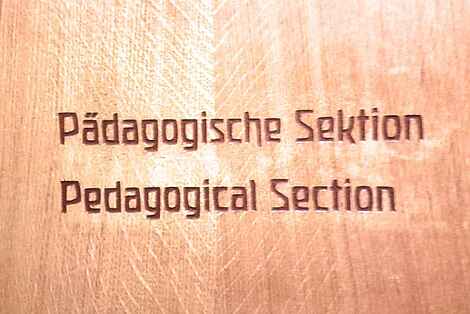The Pedagogical Section is a department of the School of Spiritual Science at the Goetheanum in Dornach, Switzerland. It deals with today's educational questions and challenges and aims to contribute to the education of children and young people from a human perspective. In doing so, it recognises the dignity of humankind, the uniqueness and freedom of the human being, and humanity’s quest for relationship with the world. The Pedagogical Section seeks dialogue and exchange with people and institutions who are committed to such perspectives in education.
Rudolf Steiner's pedagogical impulse is founded in the search for recognition of the human being as a being-in-becoming, arising from mutual relationships with others and the world. The Section's mission is to make these contributions accessible to educators and practitioners, and through research, to contribute to an education for humanity, for today and tomorrow.
A worldwide network
Over the last 100 years, Rudolf Steiner's pedagogical approach has given rise to an international educational movement. Today, this movement includes kindergartens and schools (Steiner/Waldorf schools), teacher education centres and school associations in 76 countries. The Pedagogical Section works in a free, collaborative relationship with teachers, educators and trainers, along with the responsible institutions and bodies in this worldwide movement.
The Section organises professional development meetings and research colloquia, small-scale conferences and large congresses to which interested people from all over the world are cordially invited.
Subscribe to our newsletter, we will be happy to keep you informed.
The following topics will be the main focus of events, publications and research activity in the years 2022 to 2027:
- Pedagogical anthropology and the spiritual deepening of educational practice
The relationships between the bodily, spiritual and soul aspects of the human being are in constant mutual relationship and development. As a basis for pedagogical action, therefore, the task arises of developing and enhancing the possibilities of perception in such a way that attention can also encompass this becoming. So that the child can experience that he or she is seen in his or her selfhood, he or she can participate in the world in an understanding way. For the educator, the work is a task that embraces a continuous process of professional learning and development, alongside a path of self-knowledge. The teacher continues to learn in order to be able to meet and fulfil the extensive responsibilities involved in shaping the child's environment.
- Digitality
Children are entering a world that is largely manufactured and full of technology: a world that shapes consciousness, a world that is shaped from a particular consciousness. How do pupils learn to orient themselves in creative and imaginative spaces? What contributes to the formation of a shared consciousness of a living earth? These are questions of learning, of memory, of interest; questions about the interconnectedness of corporeality and the capacity to learn, of autonomy and the shaping of a free, responsible and fruitful relationship with technology and the earth, which, in view of the technological and ecological developments of recent years, are as topical as they are fundamental.
- Interculturality and curricula
A pedagogy that understands solidarity and the will to share responsibility as a vital element of being on earth must also recognise the plurality of reality. It must seek to affirm and promote different cultures and different ways of being in the world as a basis for living together in everyday life. The challenges of understanding the «otherness» of the other, and recognising other ways of being and other cultures, and to realise this plurality in curricula and daily teaching are here. Not only the consequences of globalisation, but also well-practised forms of knowing and learning ask for an appreciative inclusion of the diverse realities of pupils' lives. It is necessary to reflect on the forms and choices of learning content and teaching practices and to develop plural perspectives that can correspond to an intercultural society.
- Resilience and school
Education is about creating an environment in which children can develop healthily. How can children and young people garner and fashion experiences in educational activity that contribute to the child's and young person’s development in body, soul and spirit and which is in harmony with the environment? How can school lessons connect with the living environment of children and adolescents and contribute to conducive development? In this context, the Section is conducting a long-term study on resilience. Read more here
- Training and further education
For the training and further education of educators, teachers and lecturers, the question arises of identifying, deepening and updating the pedagogical foundations and principles in ways that are timely and sustainable. In particular, seminars and specialist conferences will focus on the deepening of spiritual science, the anthroposophical study of the human being and the educational approaches and methods already developed and those waiting to be developed. Read more here
See also here from the 18th minute in a video report which projects the Pedagogical Section is planning for the near future.
